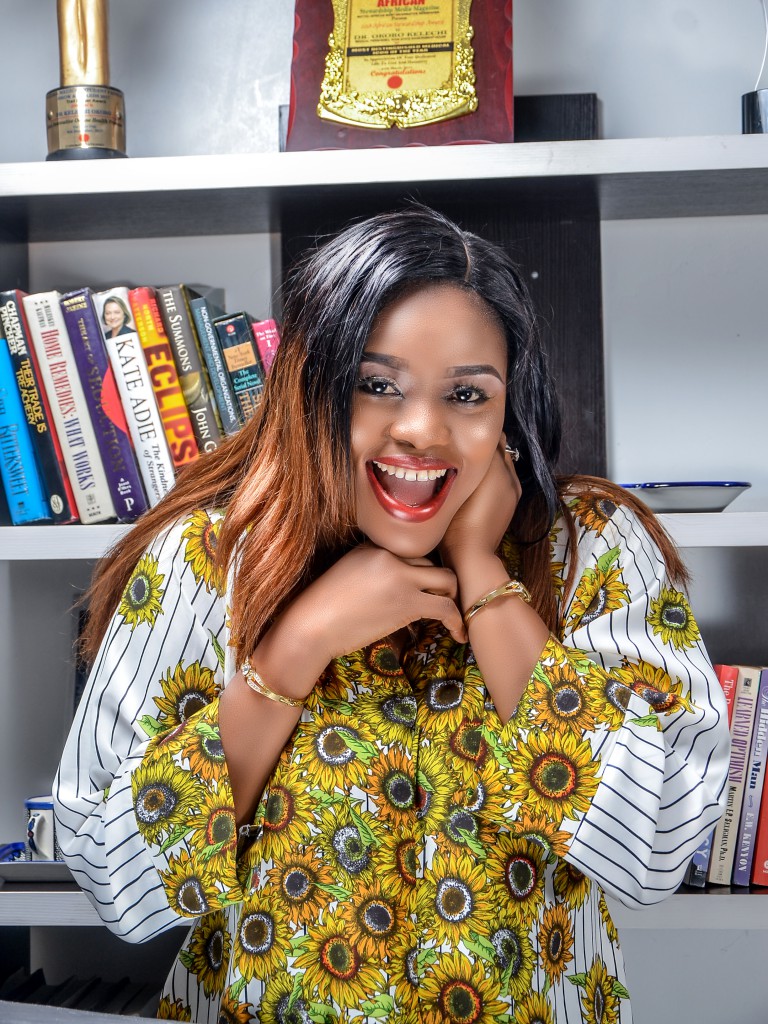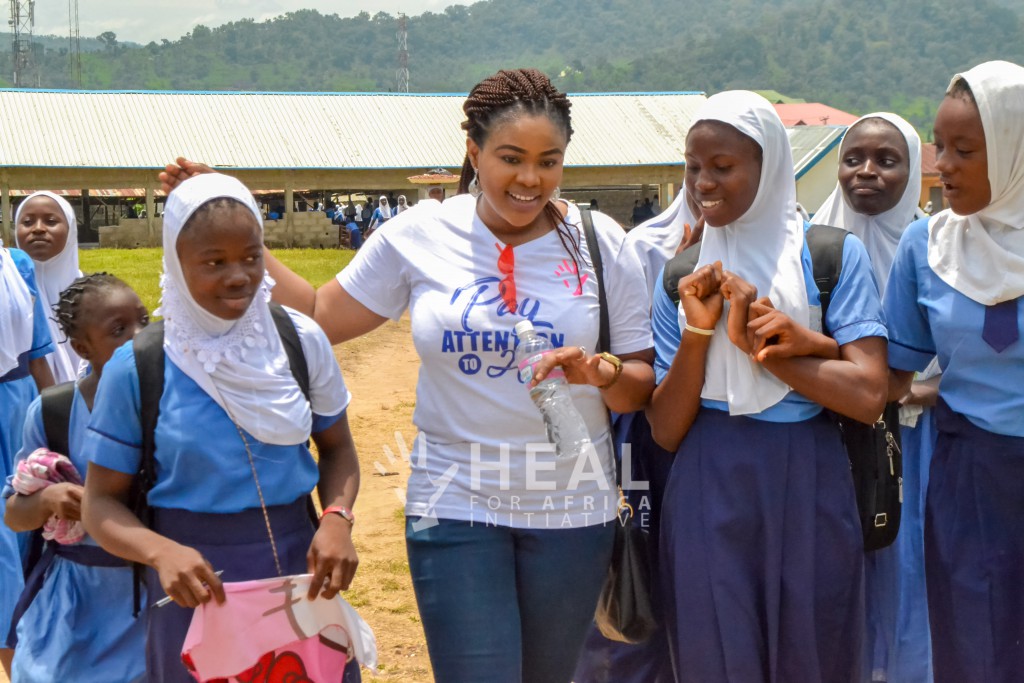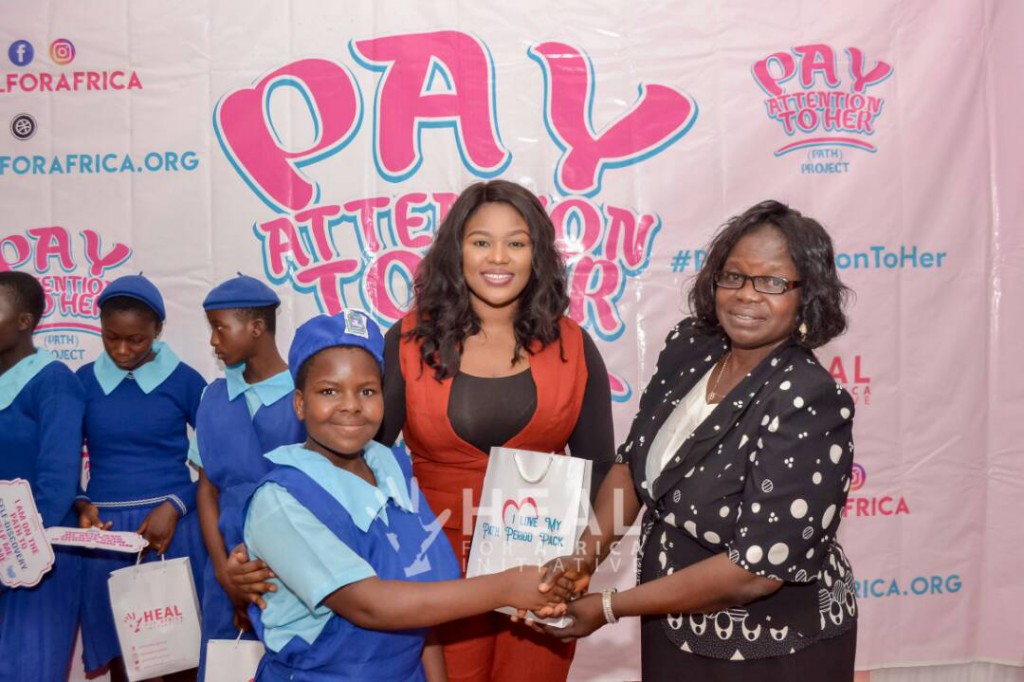Popularly referred to as Dr. Kel, Dr Kelechi is a resourceful Medical Doctor who possesses excellent clinical skills as well as good relational ability that has won the trust and endearment of her patients and the general public, both offline and online. A public health enthusiast, health communicator, Sexual and Reproductive Health and Rights Advocate and content creator.
Dr. Kelechi is the convener of the “Healthertainer” brand which promotes total health and wellness across all social media platforms. The brand is renowned for stirring up trending conversations with regards to important and prevalent health issues and proffering solutions to the dire health challenges faced in Nigeria. She is also the founder of HEAL for Africa & Pay attention to her, two initiatives aimed at promoting health education and female hygiene. She is committed to promoting health literacy globally with verifiable successes in effective health communications and generating active participation and engagement among people. Kelechi currently works as a physician in the Kogi State Government House Clinic, Lokoja while she runs her platforms. The foremost health activist shares her inspiring story with me in this educative interview.

Childhood Influence
Yes, my childhood prepared me for what I do now. I grew up in an environment filled with love and excitement. I am the 10th child of my father and 3rd from my own mum. We didn’t lack anything growing up. (I am from a united and peaceful polygamous home. We were fondly called “The Okoro House of Commotion” because of our family escapades. LOL. such sweet memories). I had all the emotional, moral, spiritual and financial support any child needed, however, as I began to get older and see life from my own eyes, I realized that there was more to life. Interacting with other children from less privileged homes made me realized how lucky I was and also taught me to be sympathetic toward other people’s plight. Subconsciously, I grew up with a resolve to show affection to everyone around me, especially those who couldn’t afford the luxury. Another period that prepared me for what I do today was going from a period of plenty to nothing. This was during my university days. Every family has their financial ups and downs and when we faced ours, I had a personal experience of what it meant to have nothing and my resolve to attain the capacity to always help the less privileged grew even stronger. It was during those trying times that my entrepreneurial spirit was awoken. I learned how to earn money not only for myself but to cater to the needs of others. Let’s just say, I have always taken it as a point of duty and privilege to be a source of hope, help, and inspiration to others.
Inspiration behind “Healthertainer” & “Heal for Africa”
The word “Healthertainer” was originally coined by me from two words I love and can totally relate with: Health and entertainment, representing my profession and my personality. The brand was born out of my desire to make health palatable and relatable for the layman to understand. While in medical school, I noticed a communication barrier between doctors and patients which resulted in poor patient outcomes. Patients did not understand their conditions or the role they needed to play in ensuring better outcomes while managing their conditions. Also, I realized that many Nigerians are suffering and dying from preventable illnesses and complications of diseases which could have been prevented or even better managed if detected early. This was largely due to a lack of proper health information. I decided that when I became a doctor, I would simplify health information delivery and improve healthcare in Nigeria using the preventive approach. I am currently into clinical practice but spend a lot of my time using innovation and entertainment to drive health advocacy both offline and online. I use my social media platforms to promote health in an entertaining manner without losing the core message and more Nigerians are becoming more interested in learning about their health. My brand is barely 2 years old and it has grown a community of over 100,000 followers across all platforms. In less than 2 years, my brand has become the ‘go to’ when it comes to social media health advocacy. I can proudly say that the Healthertainer brand has blazed the trail for health influencers in Nigeria. I have inspired and mentored more medics to use social media to promote health and wellness.

Of over 180 million people in Nigeria, Only about 98.3 million persons use the internet. This means that the remaining 81.7 million will not have access to all the information available online. This informed my decision to start a non-profit organization (Heal for Africa Initiative) that carries out health advocacy in the local communities. Heal for Africa initiative was born out of the desire to reach out to the underserved populace and more impact lives. Before I started my own initiative, I had volunteered for other NGOs as a resource person and sponsor. I also did a lot of personal charity, randomly helping people in need. In 2017, I decided it was time to start my own thing and build a structure that would outlive me and also provide a bigger platform to grow more leaders and touch more lives. HEAL stands for Health, Education, and Advocacy for better Livelihood. This acronym embodies our core aims and objectives. We are committed to “healing’ Africa, one community at a time. (www.healforafrica.org)
Being an advocate and working in public health sector
I must say it is not easy at all having to combine my 9 – 5 job, the Healthertainer Brand and directing the organization’s projects, but somehow, the work gets done. Having a supportive boss who also happens to be a member of the board of trustees, has helped a great deal to make things easy. Having a reliable team we call the “Heal Tribe” as hands and legs of the organization also keep our projects running even when I am not available. All this is time-consuming, but striking a balance and managing time effectively helps. Although sometimes it gets overwhelming, we are, however, working hard to develop a structure that can be self-sustaining.
Impact of “Pay Attention to her” Initiative
“Pay Attention to Her (PATH) project focuses on Reproductive Health outreaches for adult women; menstrual hygiene management and sexual health outreaches for adolescents girls and females in their early adulthood and Sexual Health outreaches for adolescent boys and males in their early adulthood (Pay Attention To Him). On the 28th of May, 2018, we launched the PATH School Tour to empower girls in public schools and rural areas. During this exercise, they are enlightened on their role as nation builders in addition to sexual health education and menstrual hygiene management. All participants are given free sanitary pads and personal hygiene products ( Soap, liquid antiseptic, toothpaste, tissue paper, deodorant, etc). We also enroll them into a network we call the “Big Sister” network so that we can have a sustained communication with the girls. So far, over 2,000 girls in 3 public schools have benefitted from this exercise. The experience has been fulfilling. After each program, the immediate impact is palpable. The girls gain a new sense of belonging and self-confidence. You can visibly feel their excitement and gratitude as they finally find a safe place to seek more knowledge about the biological and emotional changes that come with puberty. The reassurance of a brighter future as they interact with our female guest speakers. Our programs have attracted the likes of the Secretary to the Kogi State Government, Mrs Folashade Ayoade, Chief Press Secretary to the Governor, Mrs Petra Akinti Onyegbule, Mrs. Bolanle Amupitan, Kogi Commissioner for Women Affairs and Social Development, Mrs Sanda Musa, Special Senior assistant to the governor on Women and Child Development, and other prominent and inspiring role models in the community.This year, we will be rolling out more initiatives to cater to the women, adolescent boys and young adults in line with our goals, vision, and mission.
Challenges
After our lectures, we gift the girls with disposable pads for just one or two menstrual cycles. That is not enough. How do we guarantee that they have sanitary materials for the next? We want to offer more sustainable options, but they come with challenges. The reusable cloth pads are more sustainable but the challenge that comes with this is the lack of Water, Sanitation, and Hygiene (WASH) facilities in public schools and rural areas. Another option is the use of Menstrual Cups, the challenge here would be low acceptability due to cultural and religious beliefs.
Our society doesn’t see the need to talk about menstrual hygiene. It is perceived as a taboo or a filthy experience that should be spoken about only behind closed doors. As a result of this, a lot of young girls go through their initial experiences with so much confusing and guilt. Another major challenge we face is funding for projects. 90 percent of funds used for projects are personal. The other 10 % comes from a close network of friends/ family and also from my online community. We have plans to improve fundraising efforts via sales of branded items, membership and sourcing for grants to help us make more impact this year.

Other Projects
Heal for Africa has another project called HEAL THE SLUMS project. People living in the slums are denied basic rights such as good food, healthcare, shelter and potable water which makes live unpleasant for them. This project is dedicated to this group of people to show them affection during festivity periods. The Heal The Slums project is also an avenue to interact with community leaders and other stakeholders to conduct a needs assessment around basic amenities and discussing means of meeting those needs. It is our way of reaching out to underserved communities to show affection and inspire hope. So far, 4 Communities in Kogi State have benefitted from this program. Outside the hospital and civic space, I do public speaking, compering corporate events and volunteering with other organizations to drive other SDGs.
Last year, I partnered with another brilliant Doctor, Chukwu Analo on the “Health Simplex’ brand. Health Simplex is our own little innovative contribution to the actualization of the Sustainable Development Goals 3 and 17: for Good health and wellbeing and Partnership for the goals. The mission is very simple, Incorporate Information and communication technology and Health as to provide good health for all. This is a project to look out for this year. (www.healthsimplex.com). So you see, I am a serial hustler. Lol. I do a lot of “small small” businesses here and there to augment my salary as a doctor so I can keep funding my passion.
Reward
My greatest reward is the satisfaction and recommendations I get from doing what I do. I really didn’t know how impactful my work was until people started giving testimonies of how my life of impact has spurred them to start their own initiatives. Also, putting smiles on the faces of our beneficiaries, inspiring hope and having so many young people look up to me has been a source of joy and motivation for me. In barely 2 years of my service to humanity, I have seen how much impact these little acts of kindness here and there can ignite in other people’s lives and I want to keep being a vessel of impact in my community.I am motivated by the results so far and I want to keep doing more. Another great motivation for me is the impact it has on my own life. I am becoming a better person and enjoying the fulfillment and peace of mind that comes with supporting others.
High rate of depression & why Government should intervene
I think depression seems to be on the rise because more people are beginning to admit that they suffer from it. The problem has always been there, but poorly diagnosed. Although there is still a high level of stigmatization associated with depression these days people are more open about it. Another reason is that people are allowing the pressure of the modern world to get to them. The high expectations from society and the quest for fame, luxury and money are also driving a lot of youth especially, to anxiety, depression and eventually suicide. Depression is no respecter of socioeconomic status, Rich people get depressed too, but poverty and scanty livelihood have also been implicated as risk factors for depression. What the government can do is to improve the economy and also help spread awareness on mental health issues. Expert management of depression can be expensive so the government should support.
On giving up
Many times I have felt like giving up. Many times I have felt frustrated, underachieved and underappreciated for all the hard work I put in. But, in my lowest moments, testimonies from people I have helped indirectly or directly spur me back into action.
I remember when my first Instagram account was hacked at 28,000 followers, I was downcast. I didn’t know where to start. In fact, I decided to throw in the towel, but I couldn’t because people kept on calling to find out when I was coming back online, narrating how my page had helped them in one way or the other. I had no choice than to start all over. The funny thing is, when I started all over, that was when clients started requesting my service. I had paid my dues and it was time to reap what I had sown. I started earning a lot from my Healthertainer platforms, working with local and international health brands. It felt good to earn money while living my passion.
Who and What Inspire me to be better….
I am inspired by every strong woman out there who are excelling in their various spheres of life despite the odds against them. I am inspired by people like Oprah Winfrey, Taraji P Henson who kept believing in themselves and pursuing their dreams till they had their big breakthrough. I spent 11 years in medical school ( Studying medicine in Nigeria is a major struggle, story for another day, I promise) and graduated at the age of 28, I felt as if I had wasted so many years and I didn’t have much time to leave a meaningful life. I can proudly say that I have achieved so much between the age of 29 till date (I turned 32 on the 2nd of February, 2019). I haven’t gotten my big breakthrough, but I have activated the process that will get me there.I have a lot of young people who look up to me. Small me, and I am already a mentor to many, This inspires me to live a life worthy of emulation. I don’t want to be anybody’s role model, I do not want to be put on a pedestal, I just want to groom more young people to aspire to do better than me and be a source of inspiration to the next generation.
One thing I wish I could change in the Health sector
I would like to talk to medical students and prepare them for life after medical school. All we learned in medical school was how to save other people’s lives but not how to survive in the real whole. We need more than medical knowledge to survive after medical school. The whole is changing. I want to educate medical students on the need to develop other aspects of their lives and also equip themselves with survival skills that are not in the school syllabus. Medicine in Nigeria is no longer a “rag to riches” story, gone are the days when you graduate from medical school, save house job money and buy a “Camry I don buy my own”. After the internship, the real struggle continues. In a country like Nigeria where doctors pay is not commensurate to the service rendered, extra skills are important for survival. I have been able to survive the system so far because of my entrepreneurial and social media skills.
Being a Woman of Rubies
I guess I have earned the “woman of rubies” title because a lot of people recommended me on your platform (Smiles). Seriously, I am honored and humbled to be recognized as a woman of substance. A woman who should be celebrated for her contributions towards making the world a better place. Women of Rubies are women whose stories are inspiring hope and transformation across the globe. Women who have managed to maintain a sane work-life balance as they voyage the path of self-discovery and actualization. Women who are supporting and encouraging other women by sharing their hope-inspiring stories and practical tools to achieve their dreams. I believe that my life and activities in the last few years have depicted these values. Ruby is a precious gemstone that epitomizes passion, confidence, courage, determination, adventure, and vitality. The ruby stone is also known for its durability, hardness, and luster. I can proudly say I am a woman of Rubies because I share these same attributes with the Ruby stone.
Appreciation of Female doctors In Nigeria
Doctors are not appreciated generally in Nigeria, both male and female. I don’t think there is any marginalization of the female doctors in particular.
Health Nuggets
“Women need to make their health a priority. An unhealthy woman cannot run her home effectively”
“Regular health checks can save your life.”
“Screen and get vaccinated against the Human papillomaVirus (HPV) vaccine that causes Cervical Cancer.”
“Adopt a healthy lifestyle and dietary habits that reduce your risks of developing other cancers.“
“ Learn how to do the self-breast examination and always check your breasts for changes that may be symptoms of breast cancer. Early detection is key.’
“MOVE! A sedentary lifestyle predisposes you to obesity and heart diseases. Exercise at least 30 minutes a day five times a week. Don’t wait till you enroll in a gym. If you can’t brisk-Walk, skip, cycle, run or jog around your neighborhood, JUST DANCE IN YOUR LIVING ROOM.”




